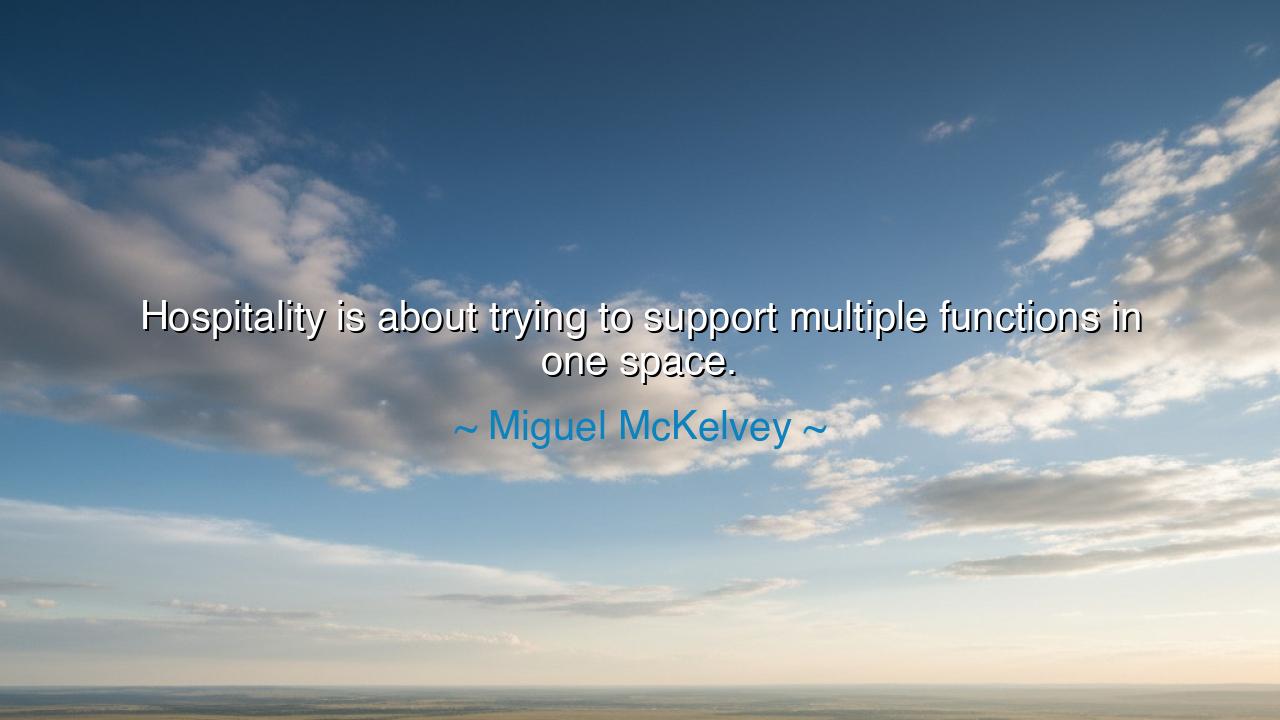
Hospitality is about trying to support multiple functions in one






Hear the words of Miguel McKelvey, builder of communities and seeker of harmony in shared living, who declared: “Hospitality is about trying to support multiple functions in one space.” Though simple in its phrasing, the thought bears the weight of ancient wisdom. For what is hospitality but the art of making room—not only for people, but for their needs, their differences, their many ways of living and being? To practice it is to weave together diverse threads into a single dwelling, where all may find rest and purpose.
The meaning shines when we reflect upon the heart of hospitality. It is not merely the offering of food or the giving of shelter. True hospitality creates a space where many lives may intersect without conflict, where solitude may rest alongside fellowship, where labor and leisure both find their appointed time. To “support multiple functions” is to recognize that every human brings a different rhythm, and a place of welcome must embrace all those rhythms without tearing apart. Thus hospitality is not narrow, but expansive; not rigid, but adaptive; not for one alone, but for many together.
The origin of this wisdom lies deep in human tradition. Consider the ancient inn along the Silk Road, where merchants, pilgrims, and wanderers of countless nations came together under one roof. There, a single hall might serve as a dining place, a resting ground, a marketplace of exchange, and even a place of worship. The innkeeper’s art was to allow all these functions to coexist, without one silencing another. In this way, the inn became more than a building—it was a living symbol of human connection, a bridge across cultures and tongues.
Think also of the monasteries of old Europe, where the same cloisters housed prayer, labor, study, and hospitality to the traveler. The monks understood that a holy space must be more than a place of silence; it must also be a refuge for the weary and a school for the young. Thus, multiple functions were supported within the same walls, not as chaos, but as harmony. What McKelvey expresses in modern words is what these keepers of wisdom practiced: the art of designing places that serve the fullness of human life.
But hospitality is not only about buildings; it is about the heart. To practice it in our personal lives is to create a “space” within ourselves where others may belong. The functions we support may be different perspectives, different cultures, or even different moods of those we love. Just as a house must shift to hold both the feast and the quiet evening, so must our hearts learn to adapt, to welcome, and to hold. The hospitable soul is one that can be a shelter for many, without losing its own strength.
The lesson for us, then, is clear: do not seek to make your life a narrow room with only one purpose. Instead, cultivate in your home, your work, and your spirit a space that can hold many functions—joy and sorrow, rest and striving, solitude and fellowship. This is the art of balance, the art of generosity, the art of hospitality. For in this balance, others find belonging, and you yourself find growth.
Practical action flows naturally: in your home, create corners for rest, but also tables for gathering. In your work, design routines that allow both productivity and reflection. In your relationships, learn when to offer laughter, and when to offer silence. And in your own soul, build a dwelling where both strength and gentleness may abide together.
Take this as a torch for your journey: true hospitality is not the perfection of a single function, but the harmony of many within one space. Like the great inns of the past, like the monasteries that sheltered body and soul alike, so too must you design your life to be a place where all that is human can find welcome. In this, you will not only serve others—you will also discover the fullness of your own being.






AAdministratorAdministrator
Welcome, honored guests. Please leave a comment, we will respond soon